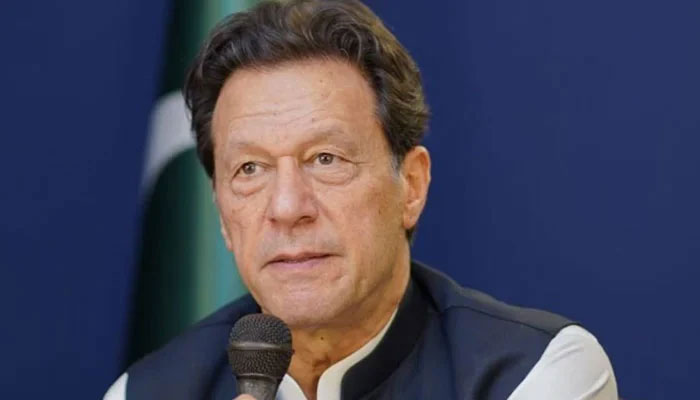Whither ‘real power’?
Pakistani politics is not moving on from the stalemate it has been in for months – in fact even more than a year. In keeping with what his party has been espousing the past few weeks now, former prime minister Imran Khan stated on Friday that he would only engage in dialogue with those who hold ‘real power’. His statement came a day after judges of the Supreme Court hearing the appeals against the amendments to the National Accountability Bureau (NAB) laws advised him to start a dialogue with politicians and resolve issues. On being reminded that his party boycotted parliament and thus could not improve the NAB laws, Imran admitted that it was a mistake and he should have gone to parliament. The court also told Imran that parliamentarians were not the enemy. This was all good advice. Unfortunately, the party has responded by saying that judges should stick to the law instead of advising on political matters. It seems the PTI is just not interested in holding talks with its political opponents. Earlier, there were reports that Imran had decided to ‘step back’ from his rigid stance, ordering his party leaders to establish contacts both inside and outside parliament to ease the ongoing political tension. Those claims, however, seem to have been unfounded.
On the one hand, the PTI says it will not talk to the parties that allegedly benefitted from a ‘stolen mandate’ and on the other, it is willing to talk to those it says helped apparently steal the mandate. The contradiction is stark and senseless. The justification given by PTI supporters is that the government and its allies have no real power and cannot help the party so why not talk to those who hold the real power. The party and its leadership can give a thousand reasons to justify this stance but for many political analysts the PTI has never really been interested in holding talks with political parties – whether when it was in the government or now when it is out of power. The PTI has only ever been interested in negotiating with power dealers and coming back to power.
At the other end, PML-N President Mian Nawaz Sharif has said he does not harbour malice, enmity or revenge against others. As Nawaz referred to the Charter of Democracy, one was reminded of how – despite everything – the PML-N and the PPP have over the years realized the importance of talking to political rivals and having a working relationship with them in order to keep the democratic system working. Yes, the current government may be a beneficiary of the hybrid system but the parties at the helm also understand the importance of real democracy. They are aware that without all political players on board, this isn’t possible and hence the offer to the PTI for talks. Observers also say that one reason the PTI isn’t talking to its rivals is due to its supporter base and maintaining its popularity. However, this rigid stance might eventually backfire if the government continues for its five-year tenure. Then the PTI may regret not having talked to the political class. The fact is that political parties, despite their flaws, operate within a framework of democratic norms and institutions that provide mechanisms for oversight and accountability. By excluding these parties from the conversation, what are we left with?
-
 Prevent Cancer With These Simple Lifestyle Changes
Prevent Cancer With These Simple Lifestyle Changes -
 Experts Reveal Keto Diet As Key To Treating Depression
Experts Reveal Keto Diet As Key To Treating Depression -
 Inter Miami Vs Barcelona SC Recap As Messi Shines With Goal And Assist
Inter Miami Vs Barcelona SC Recap As Messi Shines With Goal And Assist -
 David Beckham Pays Tribute To Estranged Son Brooklyn Amid Ongoing Family Rift
David Beckham Pays Tribute To Estranged Son Brooklyn Amid Ongoing Family Rift -
 Jailton Almeida Speaks Out After UFC Controversy And Short Notice Fight Booking
Jailton Almeida Speaks Out After UFC Controversy And Short Notice Fight Booking -
 Extreme Cold Warning Issued As Blizzard Hits Southern Ontario Including Toronto
Extreme Cold Warning Issued As Blizzard Hits Southern Ontario Including Toronto -
 Lana Del Rey Announces New Single Co-written With Husband Jeremy Dufrene
Lana Del Rey Announces New Single Co-written With Husband Jeremy Dufrene -
 Ukraine-Russia Talks Heat Up As Zelenskyy Warns Of US Pressure Before Elections
Ukraine-Russia Talks Heat Up As Zelenskyy Warns Of US Pressure Before Elections -
 Lil Nas X Spotted Buying Used Refrigerator After Backlash Over Nude Public Meltdown
Lil Nas X Spotted Buying Used Refrigerator After Backlash Over Nude Public Meltdown -
 Caleb McLaughlin Shares His Resume For This Major Role
Caleb McLaughlin Shares His Resume For This Major Role -
 King Charles Carries With ‘dignity’ As Andrew Lets Down
King Charles Carries With ‘dignity’ As Andrew Lets Down -
 Brooklyn Beckham Covers Up More Tattoos Linked To His Family Amid Rift
Brooklyn Beckham Covers Up More Tattoos Linked To His Family Amid Rift -
 Shamed Andrew Agreed To ‘go Quietly’ If King Protects Daughters
Shamed Andrew Agreed To ‘go Quietly’ If King Protects Daughters -
 Candace Cameron Bure Says She’s Supporting Lori Loughlin After Separation From Mossimo Giannulli
Candace Cameron Bure Says She’s Supporting Lori Loughlin After Separation From Mossimo Giannulli -
 Princess Beatrice, Eugenie Are ‘not Innocent’ In Epstein Drama
Princess Beatrice, Eugenie Are ‘not Innocent’ In Epstein Drama -
 Reese Witherspoon Goes 'boss' Mode On 'Legally Blonde' Prequel
Reese Witherspoon Goes 'boss' Mode On 'Legally Blonde' Prequel




